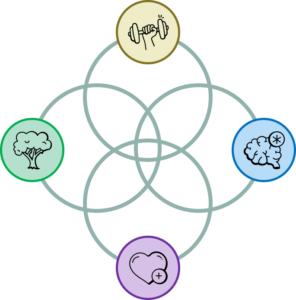Mental Wellness

Wellness is necessary for people to have satisfying, productive lives. It is a state of positive health and quality of life that enables people to meet responsibilities, pursue ambitions and grow as individuals. Just as good health supports improved function, regular function allows for the maintenance of wellness.
Four Health Dimensions work to build resilience and maintain Mental Wellness through stress, adversity, illness and injury. How people function day to day can have a positive or negative impact on these. Understanding and attending to the needs of each health dimension is important to see choices clearly, make effective decisions, change unhelpful patterns and experience lasting wellness.

Health Dimensions
The Health Dimensions are connected internally, with the human nervous system, as well as externally with our environments and interactions. When one dimension is negatively impacted the other dimensions find strategies to compensate. If the Health Dimensions are unable to effectively protect Mental Wellness, Health Imbalances can develop.

Physical
Physical health protects from chronic health issues and imbalance in other dimensions. It entails attending to our bodies’ needs and keeping a balanced lifestyle.
Ways to support Physical health include:
- Keep a balanced & nutritious diet
- Engage in physical activity & exercise
- Maintain a regular sleep schedule
- Seek medical help when needed

Cognitive
Cognitive health enables us to live productively and overcome challenges. It entails self-awareness, open-mindedness and effective problem solving.
Ways to support Cognitive health include:
- Recognize unbalanced thought patterns
- Consider the facts & alternatives
- Pursue education & career goals
- Plan and preparing for difficult situations

Emotional
Emotional health makes us more in-tune when handling difficult emotions and connecting with others. It entails awareness, expression and acceptance of our feelings.
Ways to support Emotional health include:
- Be present & focused in the moment
- Enjoy pleasant & meaningful activity
- Develop effective coping skills
- Practice non-judgement

Spiritual
Spiritual health nurtures self-esteem and the pursuit of rewarding experiences. It entails making decisions and acting in line with personal values and beliefs.
Ways to support Spiritual health include:
- Build connections with others
- Support our communities & causes
- Identify & keep personal boundaries
- Be open-minded about experiences
Health Imbalances
Many different situations may lead to health imbalances, from significant life difficulties to seemingly mundane stress and lapses in self-care. Imbalances occur frequently in daily life, and all people being learning strategies to handle them from an early age.
Imbalances typically don’t become concerns until there are multiple occurring at the same time. Because health dimensions are connected, one health imbalance can lead to others, accumulating and eventually impacting Mental Wellness.

Common health imbalances

Lack of sleep, nutrition or exercise

Relationship conflict & strain

Loss & other difficult live events

Work, school or financial stress

Lack of social or professional support
Wellness Concerns

Advanced skills are often required to address imbalances and concerns effectively. Innovative solutions can assist to mitigate or prevent future imbalances and concerns. Assistance to better understand difficulties and develop effective strategies enables people to maintain mental wellness and prevent future challenges from impacting quality of life.
Much like when a cup spills over, imbalances that linger and accumulate eventually disrupt Personal Wellness. The resulting concerns occur gradually or suddenly, and if left unaddressed act as further imbalances. The concerns people experience can vary significantly, as do the strategies to address Health Imbalances and restore Mental Wellness.
